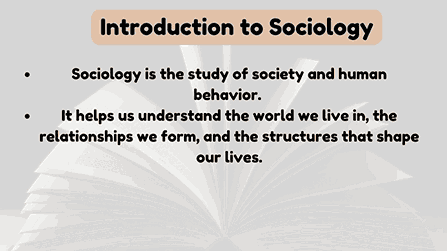
Introduction to Sociology
Introduction
Sociology is the study of society and human behavior. It helps us understand the world we live in, the relationships we form, and the structures that shape our lives. In this simple introduction to sociology, we'll explore the basic concepts and ideas that make sociology such an intriguing and valuable field of study.
What is Sociology?
Sociology is the scientific study of society, including its structures, institutions, and the behavior of individuals and groups within it.
Sociologists seek to understand how society functions, how it changes over time, and how people are influenced by the social forces around them.
Sociological Imagination
One of the key concepts in sociology is the "sociological imagination." This term, coined by sociologist C. Wright Mills, encourages us to connect our personal experiences to broader social issues. It helps us see the link between our individual lives and the larger society in which we live.
Social Structure
Society is not just a random collection of individuals; it has a structure. Social structure refers to the organized patterns of relationships and institutions that shape our lives. Elements of social structure include family, education, religion, government, and the economy.
Social Institutions
Social institutions are the structures and mechanisms that guide our behavior and serve specific societal purposes. They include family, education, religion, government, and the economy. Each institution has its own set of rules and norms, and they often work together to maintain social order.
Culture
Culture is a society's shared beliefs, customs, values, and behaviors. It includes language, traditions, art, music, and much more. Culture provides the framework for how we interact with others and understand the world.
Socialization
Socialization is the process through which individuals learn and internalize the values, norms, and behaviors of their culture. It occurs throughout our lives, starting in childhood and continuing into adulthood. Our socialization experiences shape who we become.
Social Change
Societies are not static; they change over time. Social change can be gradual or rapid, and it's often driven by various factors, such as technology, economic shifts, and cultural movements. Sociologists study how and why societies evolve.
Social Issues
Sociology also addresses critical social issues, including inequality, discrimination, crime, poverty, and more. Sociologists aim to understand the root causes of these problems and suggest solutions to improve society.
Research Methods
Sociologists use various research methods to study society, including surveys, interviews, observations, and data analysis. They collect and analyze data to conclude social phenomena.
Importance of Sociology
Sociology helps us better understand the world around us and our place in it. It provides tools to analyze and solve social problems, fostering a more just and equitable society. By examining the social forces that shape our lives, sociology can empower us to make positive changes and create a better future.
